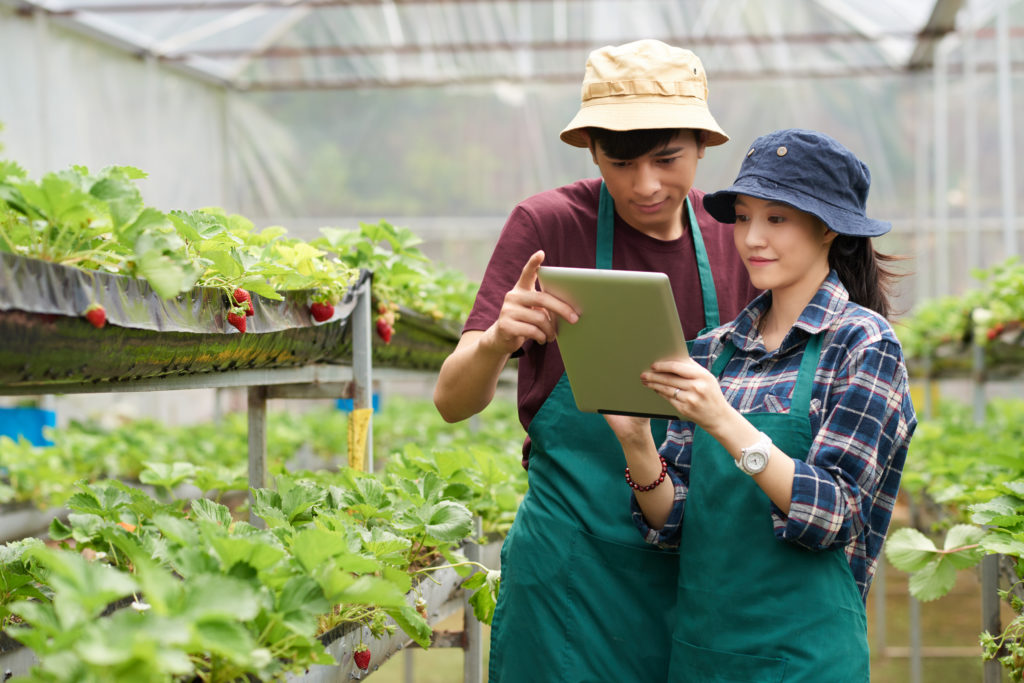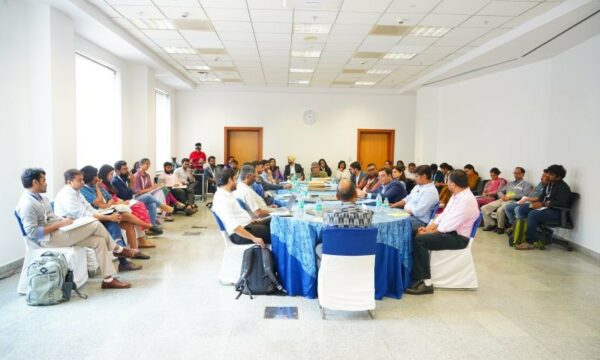We all know that the world’s growing population will need more and better food, from less farmable land, being produced by fewer farmers, in a far more volatile and changing climate. A more efficient and equitable agricultural system, in harmony with the environment, requires a step-change in how research is conducted and how its outputs and data are shared.

Opening up agricultural research and data is key to accelerating new discoveries and translating them into practice in the field. Other scientific disciplines have adopted open science but agriculture, although making some progress, seems to be lagging behind. This is a multi-stakeholder challenge, encompassing researchers, academic and research institutions, research funders, government departments and the business sector.
CABI recently hosted a webinar on this topic with a great panel of expert speakers who highlighted some of the many opportunities inherent in “open agriculture” (click here to view the webinar). They also reviewed some of the obstacles to change and gave some pointers toward possible solutions.
Let’s start with funders. In the last few years, it feels like the funders of research have really woken up to the power they have to drive change in how research data and articles are shared. Ashley Farley, Program Officer for Knowledge and Research Services at the Bill & Melinda Gates Foundation, gave a panoramic view from the research funder’s perspective of how the publication of agricultural research needs a major shake-up to maximize its impact (Making Harmful Habits History). She highlighted three major challenges to adopting more open practices.
1. Information overload
Many researchers complain there is just too much to read, which has been exacerbated the proliferation of preprints and the “publish or perish” culture within academia. Despite adding to the “noise”, Ashley argued that preprints remain a good work-around to the often slow traditional model of peer-reviewed journals, and have generated new experiments, such as community peer review, that can drive change in the system.
2. Proliferation of policies
The plethora of policies within institutions, journals and funders is confusing and hard to navigate for researchers. That said, funders are becoming much more assertive about what they expect from their grantees in terms of opening up and sharing the outputs of their research. Funders like the Bill & Melinda Gates Foundation, which is part of cOAlition S, have been driving a rights retention strategy. This has changed the expectations enshrined within funding grant agreements to ensure that grantees retain sufficient rights to make a version of their article and the underlying data freely accessible.
Ashley did flag that this does open up questions regarding an academic’s freedom of choice in terms of publication. From my personal perspective, I would add that if this choice really matters then researchers do, of course, retain the right to choose where to apply for funding.
3. Business models
If you are looking for one silver-lining to the COVID-19 pandemic then look to how it has stimulated the adoption of preprint services like bioRxiv and medRxiv, the opening up of journal articles and associated increases in readership, and the stunning increase in rapid peer-review. Of course, not all of this has been error-free, but it does highlight the art of the possible.
That said, Ashley highlighted that hybrid journals (subscription journals with paywalls that open up specific articles on payment of an article processing charge) are a real blocker. The Gates Foundation has spent $20 million funding access to around 8000 articles since 2016, and she questioned whether those funds could have been better spent elsewhere.
Linked to the hybrid journal model, which tends to dominate the list of established and respected international journals, is the impact factor – which she described as a faulty metric. In my view, the impact factor drives the publish or perish culture in academia, and allows hybrid journals to buffer themselves against the encroachment of open access – which ultimately halts both cultural change and adoption.
The corporate sector clearly has an important role to play in solving some of our big challenges in driving sustainable food security. Without the commercial sector, the link between research and practice will never be made, with opportunities for improved varieties, seeds, inputs, and machinery etc. Agricultural data and information harvested from an increasing array of sensors and satellites is both a product and potentially a service in its own right.
Derek Scuffell, Data Strategist from Knowmatics, has experience of delivering datahubs for stakeholders across global businesses. He is used to balancing businesses existing attitudes to data management versus a much more open, innovative approach. As producers and harvesters of agricultural research, how can we develop frameworks for data collaboration in the private sector?
A critical issue highlighted by Derek is that in many businesses the data entering the pipelines is at a very low level of exploitation. It requires a significant investment in time, effort and money to discover, curate, analyse, describe, extract, transform, publish and share it in a form that can be used to solve a given problem or challenge.
A new wave of integrated agricultural solutions will help us increase efficiency across the whole food system, and this needs FAIR data (data that is Findable, Accessible, Interoperable and Reusable) that can be integrated from multiple sources. This requires a fundamental culture change, in which data creation is coupled with the act of sharing in such a way that information can be consumed in ways that are specific to a business need, but produced in such a way that data can be connected to other aspects of the enterprise.
A maturing pattern that can help the private sector is the FAIR data marketplace – in which a host of datasets from a range of individual data providers can be sucked up by a data market place convener who can link, aggregate, anonymize, protect it, and then sell it to the producers of
services to a consumer. The marketplace has to ensure that some of the value created for the consumer, for which they pay, is flowed back to the data providers to maintain the system etc, and then sold on in a service.
As well as the CGIAR’s work, described by Medha Devare, Agronomist and Data Architect from the International Food Policy Research Institute, who discussed Incentivising Agricultural Researchers to Share Open and Interoperable Data, Derek highlighted Agrimetrics as another good case study of a data marketplace which provides data owners with the opportunity to transform their data into revenue, and data consumers with an easier and more affordable way to access the data they need.
To continue and read the next blog in the series on open agriculture and research, click on this link – Opening up agricultural research and data: Considering “open agriculture” from the researchers’ point of view
To view the presentation slides, click on the links below:
- – Open research: Making harmful habits history — Ashley Farley
- – Data collaboration in the agri-business sector: Lessons learned — Derek Scuffell
Ashley Farley has spent her career working in both public and academic libraries. She completed her Masters in Library and Information Sciences, where she first learned about open access through an internship at the Gates foundation. Ashley currently works as Program Officer, Knowledge and Research Services, at the Bill & Melinda Gates Foundation. Open access and open research is her primary focus. A large portion of her work has included the implementation of the open access policy, which encompasses the build and roll out of the Chronos platform and Gates Open Research. Ashley loves working on advocacy of openness, both internally and externally, assisting grantees in understanding, complying with and benefiting from the policy.
Derek Scuffell is a data strategist in the data architecture science and engineering group at Knowmatics in Farley Hill, Berkshire, UK. Derek is an accomplished enterprise data architect and digital specialist providing thought leadership and experience of implementing strategies, FAIR principles, and standards for data architecture to enable digital change in business. Has successfully defined and delivered data hubs for stakeholder groups across global businesses to drive data exploitation. Derek is highly skilled in making linked data work and particularly interested in the effective use (and reuse) of ontologies, meta-data and linked data in global business. He works widely with industry consortia to enable FAIR data in life science research, agricultural food production, and supply systems.
CABI believes that a crucial way to solve problems in agriculture and the environment is by creating, managing, curating and disseminating information. Through our experience in scientific research, publishing, knowledge management and communications, we put know-how into the hands of the people who need it most. CABI’s Open Access programme supports researchers and institutions in sharing knowledge and data. Through the open access preprint service agriRxiv, our open access journal CABI Agriculture and Bioscience, our growing list of open access books and our open tools, like the Plantwise Knowledge Bank and Invasive Species Compendium, as well as through data policy and practice development services, we work in partnership with national systems, donors and partners to improve access to development, scientific and operational data in agriculture and food systems.
1 Comment
Leave a Reply
Related News & Blogs
Unpacking FAIR’s jargon: The Indian example
Ameen Jauhar, Data Governance Lead in CABI’s Digital Development team, examines the importance of the FAIR (Findable, Accessible, Interoperable, and Reusable) data principles. Drawing from his experience in data governance and policy, including his wor…
16 October 2024





The policies are comprehensive and very vital for projects’ sustained approaches. I would request your organization role out the projects to Kenyan rural are along the lake basin Lake Victoria where I am aware of large pieces of lands suitable for productive agriculture which can drastically reduce poverty and hunger but due to lack of resources/ hunger persist.